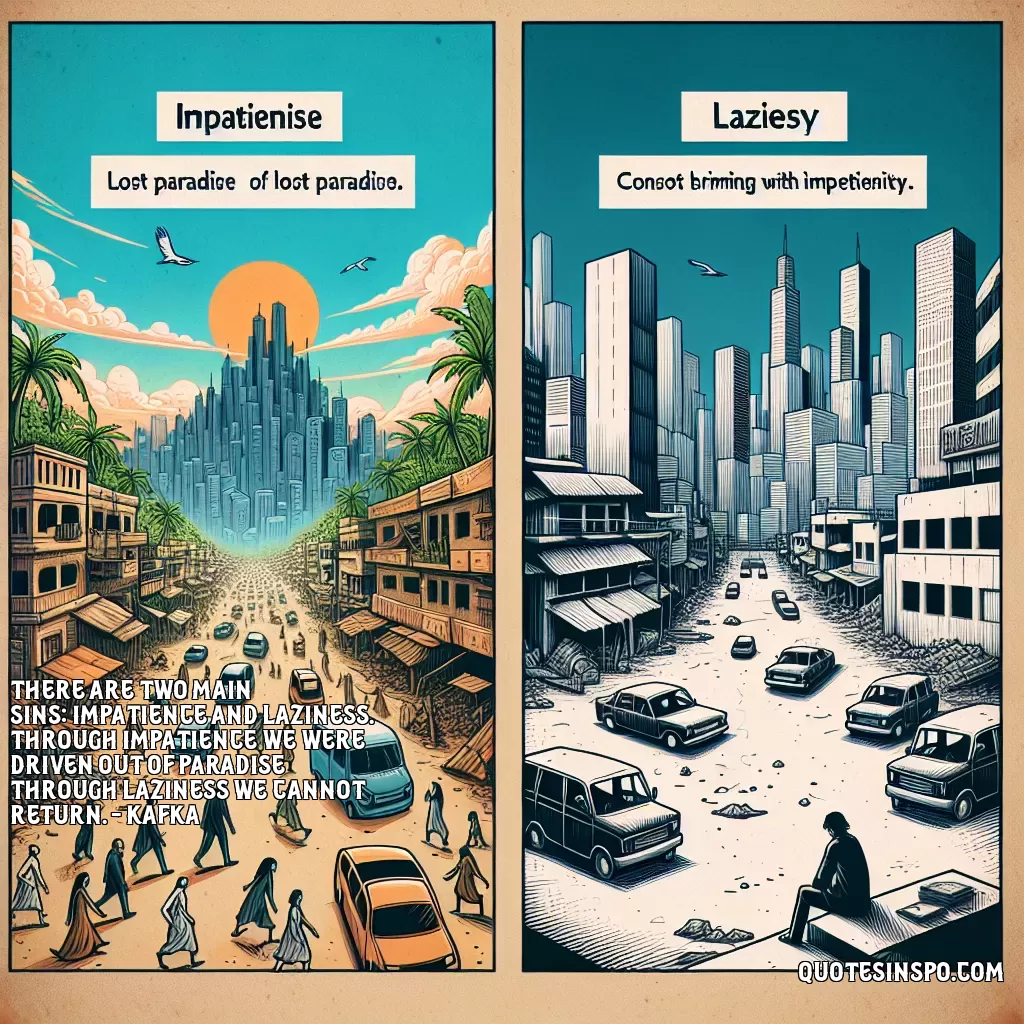
There are two main sins: impatience and laziness. Through impatience we were driven out of Paradise through laziness we cannot return. - Kafka

There are two main sins: impatience and laziness. Through impatience we were driven out of Paradise through laziness we cannot return. - Kafka
Franz Kafka's quote, "There are two main sins: impatience and laziness. Through impatience we were driven out of Paradise; through laziness we cannot return," alludes to two fundamental human flaws that impede spiritual and personal progress. The quote reflects Kafka’s existential exploration of human nature and its self-destructive tendencies. Impatience can be understood as a restless desire to achieve or experience something before its appropriate time. This is often linked with a reliance on immediate gratification, which can lead to hasty decisions and actions that deviate from wisdom or long-term benefit. In the context of the biblical allegory of Paradise, impatience represents the original sin—humans’ eagerness to acquire divine wisdom led to their expulsion from Eden. This impatience signifies a broader human inclination to grasp for more than one is ready for, often resulting in adverse outcomes. On the other hand, laziness represents an unwillingness to exert the necessary effort required for self-improvement or to achieve higher goals. This sin reflects a complacency or passivity that prevents individuals from regaining what was lost due to their previous impatience—essentially, it is the inertia that follows initial displacement or failure. Metaphorically, laziness hinders our return to a state of grace or fulfillment, as it deters the hard work, discipline, and perseverance required to rectify previous mistakes or transcend current limitations. Thus, Kafka encapsulates a profound observation on human behavior: impatience pushes us to mistakes, while laziness traps us in their consequence, creating a cycle that obstructs our pursuit of redemption or perfection. By identifying and overcoming these deep-rooted flaws, one might find the path to personal and spiritual growth, potentially regaining a paradisiacal state of being.
Quote By: Kafka
Franz Kafka, born on July 3, 1883, in Prague, was a German-speaking Bohemian writer who is widely regarded as one of the most significant figures in 20th-century literature. His work, characterized by surreal and existential themes, reflects his profound sense of alienation and anxiety, stemming from his unique position in a society characterized by rapid change and uncertainty. Kafka was the eldest of six children in a middle-class Jewish family, and his complex relationship with his authoritarian father deeply influenced his writing and worldview.
Kafka pursued a law degree at the German University in Prague, graduating in 1906. He eventually worked as a clerk at the Workers Accident Insurance Institute, a job that provided him with a stable income but left him unsatisfied and longing for creative fulfillment. Despite his professional obligations, Kafka devoted a significant portion of his time to writing, producing a body of work that would later be recognized for its innovative narrative techniques and profound philosophical inquiries.
Among Franz Kafka’s most famous works are "The Metamorphosis," "The Trial," and "The Castle." "The Metamorphosis," published in 1915, tells the surreal story of Gregor Samsa, a man who wakes up one morning transformed into a gigantic insect. This short story encapsulates Kafka's themes of alienation and the absurdity of life, serving as a powerful allegory for the human condition. Similarly, "The Trial," published posthumously in 1925, explores the bewildering and often nightmarish experiences of Josef K., a man who is arrested and prosecuted by a mysterious authority without ever knowing the nature of his crime.
Franz Kafka’s literary legacy has left an indelible mark on modern literature, influencing countless writers and artists. His work challenges readers to confront the complexities of existence and the often incomprehensible nature of bureaucratic power. Kafka's unique voice, characterized by clarity and ambiguity, continues to resonate with contemporary audiences, making him a pivotal figure in the exploration of existential themes. Despite his relatively modest output and the fact that most of his works were published posthumously, Franz Kafka's impact on literature and thought remains profound and enduring. He died on June 3, 1924, in Kierling, Austria, leaving behind a rich tapestry of literary creations that continue to inspire and provoke thought.